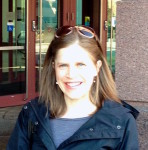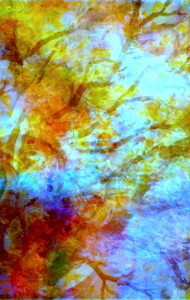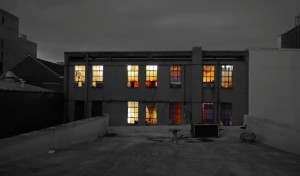 Neil Carpathios the author of three full-length poetry collections and various chapbooks. Fictions have recently appeared in: The Ampersand Review, Underground Voices, Mayday Magazine, LitroNY Magazine, Miracle Monocle, and Lime Hawk Quarterly (which nominated my short story, “Poets and Scholars” for a Pushcart Prize). He also recently edited an anthology of regional literature, Every River on Earth: Writing from Appalachian Ohio (Ohio University Press, 2015). Carpathios is an associate professor of English and Coordinator of Creative Writing at Shawnee State University in Portsmouth, Ohio.
Neil Carpathios the author of three full-length poetry collections and various chapbooks. Fictions have recently appeared in: The Ampersand Review, Underground Voices, Mayday Magazine, LitroNY Magazine, Miracle Monocle, and Lime Hawk Quarterly (which nominated my short story, “Poets and Scholars” for a Pushcart Prize). He also recently edited an anthology of regional literature, Every River on Earth: Writing from Appalachian Ohio (Ohio University Press, 2015). Carpathios is an associate professor of English and Coordinator of Creative Writing at Shawnee State University in Portsmouth, Ohio.
The Man with No Future
Nathan had just finished his pork fried rice and spring roll when the waitress brought him the bill and complimentary fortune cookie. He cracked the cookie in half but nothing was inside. He checked to see if maybe the tiny slip of paper was jammed in one of the cookie’s crevices, but there was nothing. This had never happened before in his life, let alone at Chang’s where he stopped for lunch a couple of times a week. He called the waitress over. He pointed to the broken cookie. He explained.
The waitress apologized, reached into her deep apron pocket, and handed him another one. He broke the new cookie open—and once again, there was nothing inside. He stared down at the yellow cookie pieces, then became self-conscious and wondered if anybody at a nearby table noticed. Did they see his puzzled face, or was it scared, or maybe even a little relieved, as he looked at his watch then balled up his napkin and stood up, starting to walk, peeking one more time over his shoulder at the shards like ancient relics in a museum on his plate?
As he stood at the register paying, he imagined that somebody who witnessed the scene thought it was like a one-act play called “The Man with No Future.” This made Nathan smile to himself. He handed the waitress, who now was the cashier, a ten and told her to keep the change.
There really was nothing strange about all this, Nathan thought. In fact, what was strange is that this had never happened until now. Surely mistakes were made in factories where fortune cookies were produced. He pictured an assembly-line of cookies shaped like small seashells, Chinese workers in white smocks quickly stuffing them with fortunes. The workers start to gossip, get distracted, and miss a few here and there.
The next afternoon, Nathan went to open the mail box slot with his apartment key. He hated these cramped mailboxes; the mail usually jammed and twisted the letters to fit. There was one envelope. Nathan reached in, squeezed it out. He flattened it against the wall with his palms to crush the wrinkles. It was addressed to Blake Graham, his birth name before he started going by his middle name, Nathan, and his mother’s maiden name, Hercules. It was twenty-odd years ago when his father committed suicide and he felt compelled to shed his skin, to take on a new identity—at least in terms of his name. He was a teenager and thought the pain and confusion might die away if he could imagine being a brand new person. His mother, who despised his father and was divorced from him, encouraged Blake to discard his father’s name and was pleased with Nathan as well; her husband had decided on Blake, which she never liked much.
Odd, Nathan thought. He had not received any mail with his birth name for longer than he could remember. Everyone, even bill collectors, knew him as Nathan Hercules.
Nathan didn’t wait to get back into his apartment. Standing there in the hall in front of all the other mail slots, he opened the envelope. Before he could pull out the paper, a woman in slippers he didn’t know although he’d seen her a few times walked up to get her mail. She used her key; the little metal door opened like a small safe. She coughed, nodded to Nathan, and then he waited for her to leave along together with a trail of cigarette stench.
Alone again, Nathan pulled out the paper which was neatly folded. It was clean white stock, nice quality. He unfolded and looked: the page was blank. Not a mark.
“What the hell?” Nathan thought. There was no return address on the envelope.
“Shit happens, I guess,” Nathan told himself as he walked back up to his apartment.
A few days later he was walking on the sidewalk in front of his apartment building on his way to the drugstore. He was out of band-aids and had another paper cut—occupational hazard from handling the hundreds of papers his college students turned in. With his index finger wrapped in a napkin, he took long strides, wanting to quickly walk the three blocks there. He nearly stepped on something. He looked down. In the middle of the sidewalk was a small bird’s nest. Nathan picked it up. There were no trees anywhere nearby, so how did it get there, he wondered. The nest was empty.
It wasn’t until the weekend when he was at Walmart buying new socks, he picked a bargain CD out of a bin for $2.99, “Johnny Cash Greatest Hits”— which was his father’s favorite artist, and his own, because as a kid he’d stand in the driveway watching his dad work with tools on a truck’s engine while “A Boy Named Sue” or “Ring of Fire” floated in the air from inside the garage—Nathan got inside his car in the parking lot, peeled off the tight plastic wrapping, opened the CD case eager to pop in some music, and found the case empty. He couldn’t ignore the strangeness any more.
The next morning before heading to the college he pulled a dictionary off his shelf. He looked up the word coincidence. “Exact correspondence in substance or nature” and “a concurrence of events with no apparent connection.” The word that jumped out at him was “correspondence.” Nathan looked up the word correspondence. “A close connection. A similarity. A communication or message sent or received.”
His father and mother divorced when Nathan was twelve, so amidst the normal chaos of adolescence the emotional earthquake of a family split intensified teen tectonics. His father moved away, took a job somewhere else. Nathan rarely saw him, and his mother discouraged long-distance visits. She also worked on her young son’s mind to create false memories and paint a portrait of a negligent, hard-drinking, and callous father. And when his father let the train run over him in the middle of a September night, and Nathan’s mother explained what had happened, Nathan felt more than just an earthquake. He couldn’t help imagining what it felt like to have a train crushing your body or why anybody would choose to die that way. For years after, the quaking, exploding, tremors— whatever word might come close—kept him awake nights and tortured him into self-destructive behavior such as drinking and drugs, and eventually pushed him toward the decision, nudged by his mother, to replace his name. He buried Blake Graham in a deep hole inside his chest.
For the whole week, Nathan was distracted. He had trouble getting through his classes. He couldn’t grade papers. He felt as if he were sleepwalking through the days. He hardly slept, didn’t have much appetite, and kept noticing other things: a plastic water bottle in a twenty-four pack he’d bought at the grocery without any water; a malted milk ball he bit into with just chocolate and no hardened milk center; a peanut shell he cracked open sitting on a stool at his favorite bar, Rocky’s, without a nut.
Nathan’s father was a simple man, he thought. At least those were his memories of him. He worked on cars, smoked cigars, and watched football. He had been a landscaper in summers and snow remover in winters. Manly stuff. Nathan remembered how his hands were always cracked and creased, black grime permanently lodged under his nails. His mother used to scold his dad about it.every morning during coffee and every night during supper.
“Damn, Leo, can’t you at least clean your hands! It looks like you’ve been digging crud your whole life.”
He remembers his father lifting coffee to his lips, thick fingers wrapped around a white mug. “Well, sweetest petunia, these hands are what bring home the bacon. Besides, a man should have a little grit and grime on him. Or would you rather I manicured and held my cup with a pinky sticking out like some fruitcake?”
His mother would sometimes let up, just huff, but sometimes not.
“Come on, Leo. It’s disgusting to look at when we’re trying to eat. Conjures all sorts of disgusting thoughts.”
“Like what, for instance?”
Now they’d be looking right at each other, eyes sending out beams of searing anger like death-rays in some science fiction Martian movie.
“Like you scratching up deep somewhere in private where the sun don’t shine. Or wiping without toilet paper. Or you…”
“Shut up. The boy is sitting right here between us. Do you have a brain in your head?”
The landscaping and snow removal business had been declining every year. There was just too much competition. Nathan remembered his father taking part-time jobs, once giving him a ride in a taxi when he briefly filled-in driving for a sick friend. This increased tensions between his parents, the squabbling intensified. Lack of money, dirty fingernails—it all added up.
Then one day, the talk when they sat him down.
“Son, your mother and I have decided it would be best for me to move out. We just don’t get along, I know you know. We’re nicer when we’re apart. Hell, two angry birds need their own space to fly so they can maybe turn nicer. It would be best for you, too. You must be sick of all the squawking around here.”
“Yes, Blake. Your father is right for once in his sorry life. And it has nothing to do with you. Don’t you ever think that. This is between your father and me.”
So it went. Like so many other families all over. Nathan knew that the settings might be slightly altered, the key players different, but the basic drama was universal. Most of his own friends had come from divorced families. Then his father moved out. Moved from upstate New York to southern Ohio to take a job with an old pal who owned a tire repair shop. Then his pal’s business went under and his father was hired at a local grocery store loading and unloading food delivery trucks.
For a while, Nathan received letters, cards, and packages from his dad. In fact, his father seemed more expressive than he had ever been when he lived in the same house. Maybe, Nathan thought at the time, the old truth was in play—how a person who loses something suddenly tries hard to get it back. Maybe his father felt guilty about leaving. Maybe his father was doing it all just to feel better about himself. At first, Nathan would sometimes call and thank him, once even wrote a letter back. But then Nathan started to resent how his father ran out. He should have stayed to fight it out, he thought. The correspondence slowed down, eventually stopped.
Nathan remembered the last thing his father had sent him. It was a small box with muscle car magazines, candy bars—and one strange item: a fortune cookie. In the enclosed note, his father wrote:
They were handing out fortune cookies at the store, promoting some new Chinese noodle lunch packs. I took one and thought of you. My future doesn’t matter much, but yours does. I hope it’s a good one!
Nathan tore open the plastic wrapper, then broke the cookie open. He pulled out the tiny slip of paper and read: Freedom is not the bird’s flight, but its decision whether or not to fly. Nathan remembered not understanding, thinking what a stupid fortune. Of course, now he only vaguely recalled it having something to do with a bird, or flying. He crumpled the paper and crammed the tasteless cookie chunks into his mouth, crunching. A week later, his mother greeted him at the kitchen table with the news.
Nathan was not superstitious, but if his dead father was trying to send him some kind of message, trying to correspond after all these years, what was he trying to tell him? Empty things, things missing, things suddenly turning blank or silent. Or was it something other than his father trying to connect with him? Was he crazy to even consider such notions?
It was a little after nine in the morning, a Saturday, and Nathan sat drinking coffee on his couch that he had strategically placed to face the small window looking out onto the street. The window was round unlike most windows, like the porthole of a ship. He wondered if the architect had been a naval man. From outside the round windows gave the building a uniquely odd appearance. He listened to the muffled sounds of passing cars and gazed up at a dirty gray sky. The view was lousy but he was grateful to at least have this small opening which he sometimes imagined was the apartment’s eye or nostril or ear from which inside the room’s skull he peeped out. He was a prisoner of the apartment’s brain, he’d think to himself, trapped behind bony walls. He’d leave the apartment and continue the little drama, pretending to escape, finally free, standing on the sidewalk looking back at the apartment building which resembled a hulking brick beast.
Nathan gulped the last of his coffee, grabbed his leather jacket, and headed out. He did not stop this time, but did look over his shoulder at his small window, that today resembled a pore in the bricks’ skin allowing the beast’s rust-brown body to breathe. Then he looked again, and noticed it may have been the blow-hole of the building, the kind a whale has. He thought if this were a one-act play it might be called “The Man Who Thought Way Too Much about a Window.”
He probably thought way too much about everything. That was his problem. So what that his parents divorced? So what that his father killed himself? So what that things happen without any real explanation? Maybe that was the message his father was trying to send him: to stop trying to make sense of it all, just let the mystery of living unfold. Maybe that was the real fortune in those cookies written on invisible paper in invisible ink. He just couldn’t see them. Then he caught himself thinking about the blank paper in the envelope, the nest, the TV, the radio, the other things. “There you go again, asshole,” he actually said out loud to himself as he strode looking down at sidewalk cracks. “There you go like an obsessed lunatic.”
Or maybe, he thought, he was just not smart enough to figure out little clues that most people would easily decipher. He imagined his father orchestrating the recent doings, starting with the fortune cookies, getting frustrated that his son wasn’t “getting it.” He saw his father rolling his eyes somewhere, probably thinking his son would have to be hit over the head with a hammer before he understood.
Nathan slapped himself on both cheeks with the palms of each hand. “Stop thinking, dammit.” He looked up and saw a crow on a phone line looking down at him. “My dad disguised to spy on me.” He slapped himself again.
Outside Chang’s, Nathan stopped to look into the big front window. It was still early for lunch and he watched workers setting tables, one sweeping with a broom. The special today, hand-printed with red ink on poster-size paper behind glass, read: Sweet and Sour Fortune Cookie Chicken and Orange Sesame Fortune Cookie Cupcakes. Nathan moved closer to make sure he wasn’t hallucinating. He read more: In honor of National Fortune Cookie Day. It was September 13. He had never heard of such a holiday. “You’ve got to be kidding me,” he said out loud. In smaller print at the bottom: The first fortune cookie was invented in 1920 at the Hong Kong Noodle Company in Los Angeles, California.
“Wow, my dad is using that hammer now,” Nathan thought. “OK, dad, you want me to do something, what is it? Go inside and order the special? Or is this a test? Let’s see, you want me to keep walking and forget about it? You want me to have lunch but resist the temptation of anything having to do with fortune cookies and order something else? You want me to go to Walmart and buy another Johnny Cash CD? You want me to say I’m sorry? You want me to forgive you?”
The door of Chang’s opened and a young Chinese man with blond-dyed hair and a stud earring poked his head out. “We’ll be open in a few minutes. Happy Fortune Cookie Day!”
Nathan nodded. Then he looked back to the crow, but the crow was gone.
“A group of crows is called a murder,” Nathan thought. “Maybe a single crow is a suicide.”
A young couple came up and paused looking at the poster in the window. The man in a black beret and woman with one long ponytail read, then simultaneously looked at each other and said, “National Fortune Cookie Day?” They broke up laughing, then looked over at Nathan.
“If this were a one-act play, what would you call it?” Nathan asked the couple. They looked at each other again, slightly confused. Then Nathan walked away, passing shops, crossing streets, weaving in and out of bodies on sidewalks, sometimes looking up at the phone lines wondering about that crow, not sure where he was going, but the day was crisp and the further he walked his head felt—at least for now—suddenly clear.


 Katie Cortese
Katie Cortese Sherrie Flick
Sherrie Flick  Neil Carpathios
Neil Carpathios
